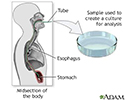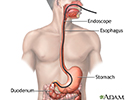Gastric tissue biopsy and culture
Culture - gastric tissue; Culture - stomach tissue; Biopsy - gastric tissue; Biopsy - stomach tissue; Upper endoscopy - gastric tissue biopsy; EGD - gastric tissue biopsy
Gastric tissue biopsy is the removal of stomach tissue for examination. A culture is a laboratory test that examines the tissue sample for bacteria and other organisms that can cause disease.
How the Test is Performed
The tissue sample is removed during a procedure called upper endoscopy (or EGD). It is done with a flexible tube with a small camera (flexible endoscope) at the end. The scope is inserted down the throat into the stomach.
Your health care provider sends the tissue sample to a laboratory where it is examined for signs of cancer, certain infections, or other problems.
How to Prepare for the Test
Follow instructions on how to prepare for the procedure. You will likely be asked not to eat or drink anything for 6 to 12 hours before the procedure.
How the Test will Feel
Your provider will tell you what to expect during the procedure.
Why the Test is Performed
This test may be done to diagnose a stomach ulcer or the cause of other stomach symptoms. These symptoms may include:
- Loss of appetite or weight loss
- Nausea and vomiting
- Pain in the upper part of the belly
- Black stools
- Vomiting blood or coffee ground-like material
A gastric tissue biopsy and culture can help detect:
- Cancer
- Infections, most commonly Helicobacter pylori, the bacteria that can cause stomach or intestinal ulcers
Normal Results
A gastric tissue biopsy is normal if it does not show cancer, other damage to the lining of the stomach, or signs of organisms that cause infection.
A gastric tissue culture may be considered normal if it does not show certain bacteria. Stomach acids normally prevent too much bacteria from growing.
What Abnormal Results Mean
Abnormal results may be due to:
- Stomach (gastric) cancer
- Gastritis, when the lining of the stomach becomes inflamed or swollen
- Helicobacter pylori infection
Risks
Your provider will discuss the risks of the upper endoscopy procedure with you.
References
Feldman M, Jensen PJ, Howden CW. Gastritis and gastropathy. In: Feldman M, Friedman LS, Brandt LJ, eds. Sleisenger & Fordtran's Gastrointestinal and Liver Disease. 11th ed. Philadelphia, PA: Elsevier; 2021:chap 52.
Sugumar A, Vargo JJ. Preparation for and complications of GI endoscopy. In: Feldman M, Friedman LS, Brandt LJ, eds. Sleisenger & Fordtran's Gastrointestinal and Liver Disease. 11th ed. Philadelphia, PA: Elsevier; 2021:chap 42.
Review Date: 10/13/2023








